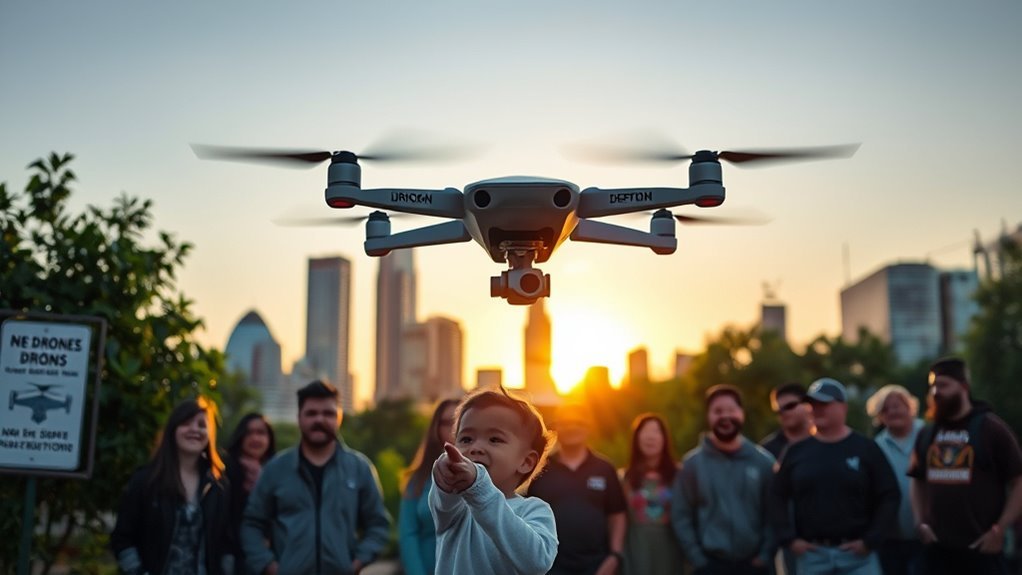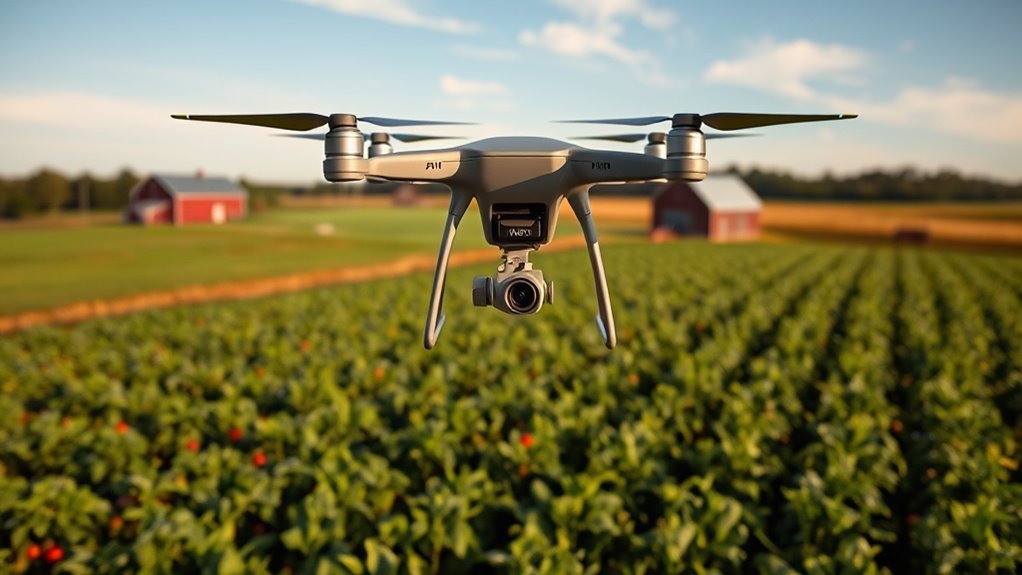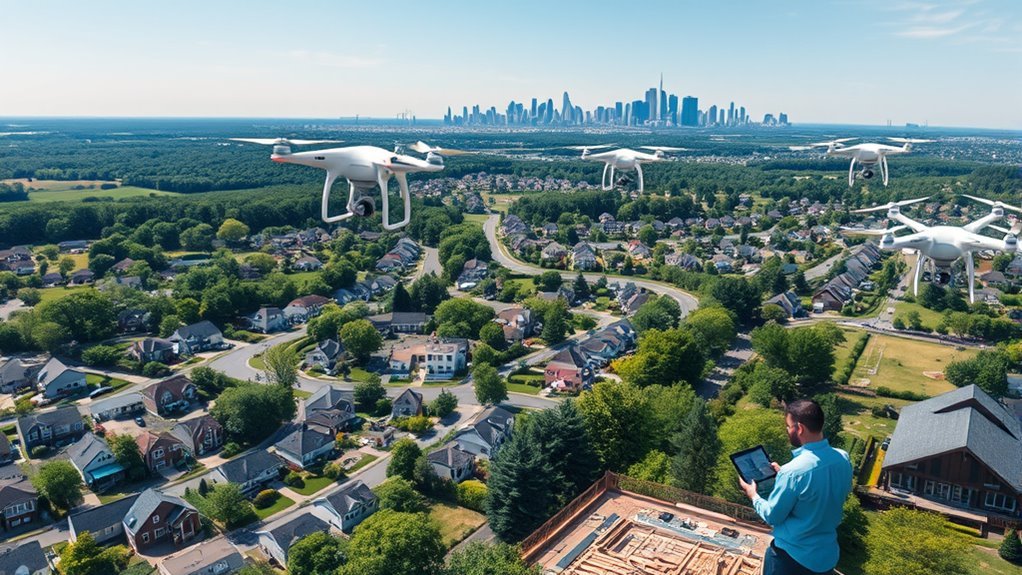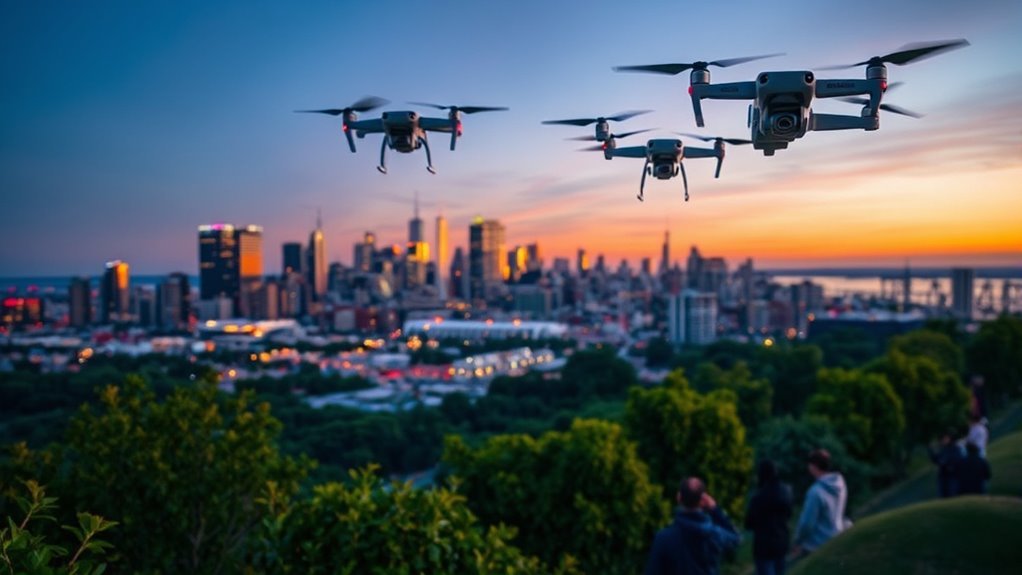New Jersey’s drone regulations are evolving, impacting operators considerably. You must register your drone and adhere to strict altitude limits while maintaining visual line-of-sight during flights. There’s a focus on pilot training for responsible usage. Drones are increasingly used in agriculture for crop monitoring and in real estate for enhanced marketing strategies. Emergency management, delivery services, and community programs are also expanding. Understanding these updates is essential for compliance and leveraging potential benefits in various sectors. Explore these developments further.
New Legislation Enhancing Drone Safety

As drone usage continues to grow in New Jersey, new legislation has been introduced to enhance safety measures and address potential risks. These updated drone regulations aim to create a safer environment for both operators and the public. You’ll find that the legislation outlines specific safety protocols, including mandatory registration of drones and adherence to operational guidelines that limit flights near crowded areas or sensitive locations. Additionally, it emphasizes the importance of pilot training and certification, ensuring that drone operators understand their responsibilities. By staying informed about these regulations, you can enjoy the freedom of flying drones while prioritizing safety. This balance between innovation and responsibility is essential as drone technology evolves and integrates further into everyday life.
Expanding Drone Applications in Agriculture

While many might associate drones with recreational use, their applications in agriculture are rapidly expanding and transforming farming practices. With the rise of precision agriculture, you’re able to utilize drones for detailed crop monitoring, giving you a bird’s-eye view of your fields. These aerial systems capture high-resolution images, enabling you to assess plant health, detect pests, and identify irrigation issues more efficiently than traditional methods. By integrating drone technology into your farming routine, you’re not just enhancing productivity; you’re also making informed decisions based on real-time data. This innovation allows you to optimize resource usage, reduce waste, and ultimately increase yields. Furthermore, advanced disease prediction models analyze aerial imagery in real time, allowing for early intervention strategies that can greatly benefit crop health. As drone technology evolves, embracing these advancements can lead to a more sustainable and profitable agricultural future. Additionally, utilizing precision crop and pest detection technologies through drones can significantly enhance operational control and minimize chemical use.
Drones in Real Estate Marketing

The integration of drones into various sectors is proving to be a game-changer, and real estate marketing is no exception. With the rising demand for innovative marketing strategies, you can leverage drone technology to enhance property listings and attract potential buyers.
Consider these benefits:
- Stunning drone photography offers aerial views that highlight property features and surrounding landscapes.
- Virtual tours powered by drone footage allow prospective buyers to explore homes remotely, saving time and increasing engagement. This technology is particularly useful for creating high-quality visuals that make listings stand out.
- Drones provide unique perspectives that traditional photography simply can’t match.
- Enhanced marketing materials lead to higher sales and faster transactions.
- Additionally, advanced camera capabilities enable real estate agents to capture high-quality visuals that showcase properties in the best light.
Emergency Response and Disaster Management
In emergency response and disaster management, drones equipped with aerial surveillance technology can greatly enhance situational awareness. You’ll find that their rapid assessment capabilities allow responders to evaluate impacted areas quickly, providing critical data for decision-making. This integration not only improves response times but also optimizes resource allocation during crises. Furthermore, drones enhance rapid aid delivery by swiftly transporting medical supplies to remote areas, fostering a proactive approach to public health emergencies with real-time disease outbreak monitoring. Additionally, advanced obstacle avoidance technology ensures that drones can navigate challenging environments safely while delivering essential resources.
Aerial Surveillance Technology
As emergency situations unfold, leveraging aerial surveillance technology can greatly enhance response efforts and improve disaster management outcomes. By utilizing drones, responders can access real-time aerial data, which is essential for making informed decisions. However, it is important to navigate the complexities of surveillance ethics to maintain public trust.
- Provides real-time situational awareness
- Enables rapid identification of affected areas
- Facilitates resource allocation and logistics
- Enhances communication among emergency teams
These capabilities not only streamline operations but also empower communities to respond effectively. When using aerial surveillance, it is critical to balance operational efficiency with ethical considerations, ensuring that the rights and privacy of individuals are respected while maximizing safety and effectiveness during emergencies.
Rapid Assessment Capabilities
While evaluating damage quickly is essential during emergencies, utilizing drones for rapid assessment capabilities can considerably enhance the efficiency of response efforts. Drones equipped with high-resolution cameras and sensors collect real-time analytics, providing responders with immediate insights into affected areas. This technology allows for thorough damage assessment, helping teams prioritize resources and deploy aid effectively. You’ll find that integrating drones into emergency management not only speeds up the evaluation process but also improves accuracy, minimizing the risks associated with traditional assessment methods. Additionally, the ability to survey hard-to-reach locations reduces the need for personnel to enter dangerous zones, promoting safety. Embracing these innovations guarantees that your community can respond effectively and adaptively in times of crisis.
Advancements in Drone Delivery Services
With recent technological breakthroughs, drone delivery services in New Jersey are evolving at an impressive pace. These advancements in drone logistics are greatly enhancing delivery efficiency, providing you with faster and more reliable options. Here are some key developments:
- Automated routing algorithms optimize flight paths for quicker deliveries.
- Real-time tracking enhances transparency, allowing you to monitor your package’s journey.
- Improved payload capacity enables drones to carry larger items, expanding delivery options. Amazon Prime Air, for example, focuses primarily on urban package delivery, which allows for efficient operations in city environments.
- Lower operational costs make drone delivery more accessible for local businesses. As these technologies continue to advance, you can expect a transformative impact on how goods are delivered, ultimately offering you unprecedented convenience and freedom in your purchasing decisions.
Regulatory Changes for Recreational Drone Use
Recent changes in regulations governing recreational drone use in New Jersey are reshaping how hobbyists and enthusiasts can operate their devices. These updated drone regulations emphasize safety and accountability while preserving your freedom to enjoy recreational flying. New guidelines require users to register their drones and adhere to specific altitude limits and no-fly zones, particularly near airports and populated areas. Additionally, the requirement for visual line-of-sight operation remains significant, ensuring that you maintain control and awareness during flights. Though these rules may seem restrictive, they’re designed to promote responsible drone use within the community. Understanding and complying with these regulations not only enhances safety but also fosters an environment where everyone can enjoy the skies. Staying informed about no-fly zones helps prevent unintentional violations and ensures safer drone operations.
Integration of Drones in Infrastructure Inspections
As the demand for efficient infrastructure inspections grows, integrating drones into this process offers a game-changing solution. By leveraging drone technology, you can enhance infrastructure safety while greatly reducing inspection times.
Integrating drones into infrastructure inspections revolutionizes safety and efficiency, significantly reducing inspection times.
Here are some key benefits of using drones for these inspections:
- Precision Data Collection: Drones provide high-resolution images and data, allowing for detailed assessments. Additionally, they can capture high-speed camera footage that enables thorough analysis of rapid changes in infrastructure conditions.
- Access to Hard-to-Reach Areas: Inspecting bridges, towers, and roofs becomes safer and easier.
- Cost-Effectiveness: Reducing the need for scaffolding or ladders lowers overall inspection costs.
- Real-Time Monitoring: Instant data transmission allows for quick decision-making and faster repairs.
- Automated monitoring techniques improve infrastructure oversight by enabling early fault detection and proactive maintenance.
Embracing drone technology in infrastructure inspections not only boosts efficiency but also enhances overall safety, paving the way for smarter infrastructure management.
Environmental Monitoring and Conservation Efforts
The integration of drones into infrastructure inspections has paved the way for their application in environmental monitoring and conservation efforts. You can utilize drones for wildlife tracking, providing real-time data on animal movements and behaviors, which is vital for effective management strategies. This technology allows for non-intrusive observation, minimizing human impact on wildlife. Additionally, drones play a significant role in habitat restoration by evaluating environmental conditions and identifying areas requiring intervention. With high-resolution imaging, you can monitor vegetation health and analyze changes over time. The ability to cover vast areas quickly and efficiently empowers conservationists to make data-driven decisions, enhancing efforts to protect and restore ecosystems in New Jersey. Furthermore, the real-time data collection capabilities of drones support proactive strategies in wildlife conservation, ensuring timely and informed actions. By leveraging superior resolution for precision mapping, these drones can capture intricate details of habitats, further informing conservation efforts. Embracing these advancements will ultimately foster a more sustainable future.
Educational Programs Promoting Drone Technology
While many may view drones primarily as tools for commercial or recreational use, educational programs in New Jersey are increasingly highlighting their potential in various fields, including science, technology, engineering, and mathematics (STEM). These initiatives not only foster technical skills but also prepare students for future careers.
Key components of these programs include:
- Drone Certifications: Offering students validation of their skills and knowledge.
- Youth Programs: Engaging young minds with hands-on experiences in drone operation.
- STEM Integration: Connecting drone technology with core academic subjects, allowing students to engage with real-world applications of the skills they are learning.
- Career Pathways: Exposing students to diverse job opportunities in emerging industries.
Furthermore, the integration of high-resolution footage in educational projects enhances students’ ability to capture and analyze data, making learning experiences more vivid and interactive.
Community Engagement and Public Awareness Initiatives
In New Jersey, local drone workshops are designed to enhance community understanding of drone technology and its applications. Public safety campaigns further aim to educate residents about responsible drone use, ensuring safety and compliance with regulations. These initiatives not only foster awareness but also encourage active participation in discussions surrounding drone integration in daily life.
Local Drone Workshops
As communities in New Jersey embrace the growing relevance of drone technology, local workshops have emerged as essential platforms for engagement and education. These workshops provide invaluable insights into local drone regulations and empower participants to navigate the complexities of drone ownership and operation.
Here’s what you can expect from these community drone events:
- Hands-on training: Learn to operate drones safely and effectively.
- Expert speakers: Gain knowledge from industry professionals and enthusiasts.
- Regulatory guidance: Understand local drone regulations to guarantee compliance.
- Networking opportunities: Connect with fellow drone enthusiasts and potential collaborators.
Public Safety Campaigns
With the increasing integration of drones into everyday life, public safety campaigns in New Jersey are essential for fostering awareness and ensuring responsible use of this technology. These initiatives aim to educate the community about drone regulations, potential hazards, and best practices. By offering drone training sessions and safety workshops, you can equip yourself and others with the necessary skills to operate drones safely and legally. Engaging local residents through interactive events not only demystifies drone technology but also promotes responsible usage. Additionally, these campaigns often collaborate with law enforcement and emergency services to highlight the importance of drone awareness in public safety. Embracing these programs can empower you to use drones responsibly while contributing to a safer community.
Frequently Asked Questions
What Are the Costs Associated With Drone Registration in New Jersey?
When considering drone registration costs, you’ll encounter various fees associated with the drone registration process. It’s essential to budget for these expenses to guarantee compliance and enjoy the freedom that drone flying offers.
Are There Specific Age Requirements for Flying Drones Recreationally?
Yes, there’re age restrictions for flying drones recreationally. Generally, you must be at least 13 years old to register, but younger pilots can fly under adult supervision. Always adhere to the flying guidelines to guarantee safety.
How Can I Report Unsafe Drone Activity in My Area?
To report unsafe drone activity, you should follow local reporting procedures. Document the incident details, focusing on drone safety violations, and submit your report to local authorities or the FAA for proper investigation and action.
What Insurance Options Are Available for Drone Operators in New Jersey?
For drone operators in New Jersey, you’ve got several insurance options, including liability coverage that protects against damages and flight insurance, which covers accidents during operation. Consider your needs to choose the best policy.
Are There Drone Flying Restrictions Near Schools and Hospitals?
Imagine you’re capturing stunning aerial footage near a school. You’ll need to be aware of drone safety regulations, as proximity restrictions often prohibit flying within 1,000 feet of schools and hospitals to guarantee public safety.

